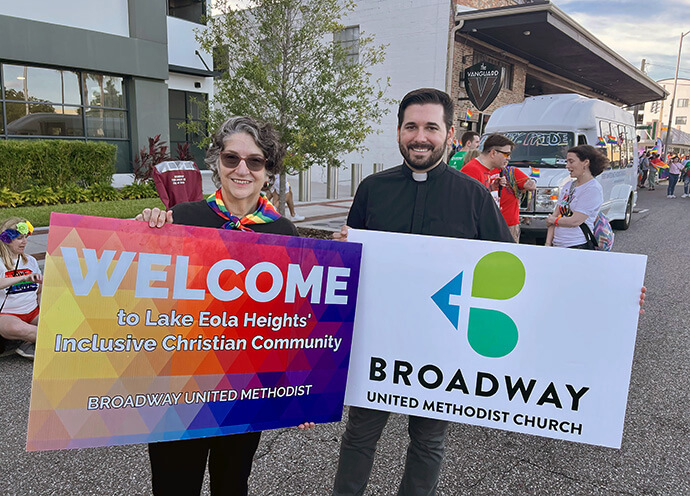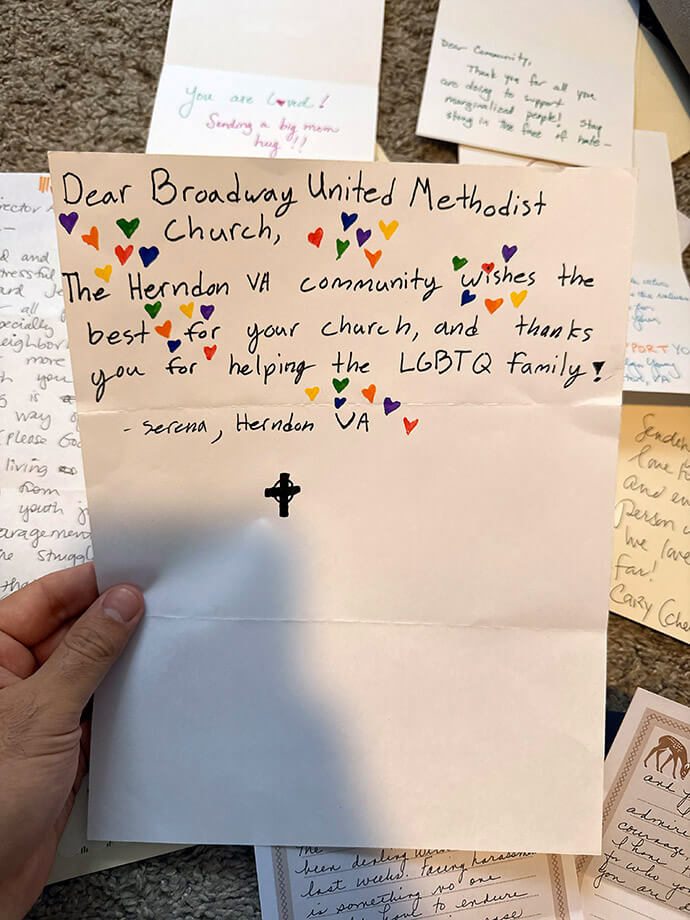Key points:
- United Methodist churches in central Florida have been among the congregations targeted in recent months by anti-LGBTQ protesters threatening to disrupt worship.
- One LGBTQ-affirming United Methodist church now has hired an off-duty police officer to provide security.
- At the same time, the pastor is heartened by the support he has received from fellow United Methodists and strangers across the country.
The Rev. Rushing Kimball knew something was off when he arrived before worship one Sunday morning to see a group of men gathered in Broadway United Methodist Church’s parking lot.
“They were blasting Christian music, trying to cast out demons,” said Kimball, pastor of the LGBTQ-affirming congregation in Orlando, Florida.
“I’m keenly aware that this is not like your normal type of happy prayer.”
The pastor worried that the group’s ruckus was disturbing the church’s neighbors in the surrounding homes. He also worried that these men might try to interfere with older Broadway United Methodist members simply trying to attend Sunday service.
So Kimball called the police, who asked the men to leave. A short while later, those same men showed up at another church — Joy Metropolitan Ministries — and disrupted that congregation’s worship. The men stood up during the children’s sermon and shouted “synagogue of sin” to the mostly LGBTQ congregants.
“They actually came inside our sanctuary and spewed hate from our safe space,” the Rev. Terri Steed Pierce, Joy Metropolitan’s pastor, told the Orlando Sentinel. The congregation ultimately was able to drown out the protesters with worship music.

The March 9 incidents are among an increasing number of menacing protests targeting LGBTQ-friendly churches in the Orlando area — many to produce content for social-media channels. At least two other churches also have had their worship disrupted, according to the Orlando Sentinel.
Both Broadway United Methodist and Joy Metropolitan Ministries, part of Metropolitan Community Churches, now have hired off-duty police officers to provide security on Sundays.
In Orlando, protesters have included at least two different couples as well as members of the Remnant Revival Outreach Center in nearby Sanford. It was men from Remnant Revival who caused the March 9 disruption.
Church leaders worry that what is happening in Orlando could become part of a national trend.
The civil rights group GLAAD, which advocates for LGBTQ equality, tracked 1,109 anti-LGBTQ incidents between June 2023 and June 2024 — more than double the previous 12 months. Such incidents include protests, vandalism and violence.
The rise in such incidents comes as The United Methodist Church itself has seen big changes. Last year, the international denomination officially removed decades-old denomination-wide bans on gay clergy and same-sex weddings.
The Florida Conference has been helping Broadway United Methodist — a church with an average attendance of about 30 people — pay for security. Disrupting religious worship is a misdemeanor under Florida law.
“Broadway is a small church, and it doesn’t necessarily have the financial capacity to provide a weekly security officer, and so we, we’ve hired an off-duty police officer each week for the past few weeks,” said Bishop Tom Berlin, who leads the Florida Conference.
To help
Security is expensive, and Broadway United Methodist Church has a GoFundMe page to help defray the costs and support the church’s ministries.
“We also didn’t want the church to have to negotiate with people that are being ugly to them in front of their building. We wanted that to be done in a civil fashion.”
Broadway United Methodist Church also has experienced protests from a married couple from Oregon. While visiting friends in Orlando, Casie and John Peterman stood on the church’s sidewalk holding signs that read “abortion is murder” and “homosexuality is sin.”
“In our hometown we do this as well. We do a lot of churches,” Casie Peterman told the Orlando Sentinel. “They always ask us, ‘Why are you here?’ Well this church is affirming sin.”
Kimball, who is gay, said since last year’s presidential election, he has seen people more emboldened to threaten the LGBTQ community.
After the election, he said he received an email with the message: “We elected Trump to get rid of your kind, to remove you from power.”
He said some protesters might think their rhetoric is loving, but what he has heard is not loving but scary.
“We need to get people out of their political bubbles where there’s no empathy or understanding, or the ability to see other people as people who are the children of God,” Kimball said.
Berlin offered a similar sentiment. “Jesus taught us when someone is doing something belligerent to us, we don’t return belligerence in kind,” the bishop said. “If someone’s yelling at us, we don’t yell back.”
But, the bishop added, it is also appropriate to set boundaries. “We do that not just to help us, but to help them,” he said.
Kimball is grateful for the support he and his church have received both from the conference, from people in the Orlando area and even from people he has never met before.
The pastor has received notes of support from as far away as Herndon, Virginia, a D.C. suburb, after a friend from seminary asked fellow clergy to send Kimball and Broadway their encouragement.

The Central Florida Pledge, a group founded last year to promote kindness, put out a call to protect neighbors and freedom of worship. After that, some 70 people showed up to surround Joy Metropolitan to prevent disruption.
Kimball also has received help from the church’s immediate neighbors in Orlando’s historic Lake Eola Heights district. He said Jewish, Muslim and agnostic neighbors, among others, have gotten up early each Sunday to keep watch at the church. For the past two weeks, there has been no protester in sight.
The Broadway United Methodist congregation plans to worship together with First United Methodist in Orlando on April 13 on Palm Sunday. Kimball has heard that protesters may be planning to show up at the joint service at First United Methodist.
But he also is heartened that fellow United Methodists are working on a plan to address whatever happens.
“Rushing has shown up for the people in the community, and that has been reciprocated,” said the Rev. Jad Denmark, the minister of congregational life at St. Luke’s United Methodist Church.
Denmark’s congregation is also LGBTQ-affirming and serves as an annual sponsor of the Orlando Come Out with Pride Parade. St. Luke’s is also much larger than Broadway United Methodist, with an average attendance of about 1,000 people.
Subscribe to our
e-newsletter
Denmark said he thinks he may have been the first pastor to encounter one of the protesters when one came up to him at October’s Pride Parade. St. Luke’s members were there alongside members of other area United Methodist churches.
“So we’re marching along, and people are cheering, and it’s just a beautiful time because people are in tears, and they’re moved that a church would be present there with love and acceptance,” Denmark said.
“This man steps out into the parade with a microphone and says, ‘You’re a pastor? I said, ‘I am.’ And I look up and there’s a woman with a camera walking backwards. I think, ‘Oh, this is going to be an opportunity just to share what our message is about the Gospel, and that it’s for everybody including LGBTQ people.’”
Denmark quickly realized his mistake. The man, the pastor said, was “here for hate, not here for grace.” He also soon realized that the protester was there for clicks, hoping to generate controversial content for his social-media channels.
Two weeks later, the same couple came to St. Luke’s at the end of worship and launched into a 25-minute theological debate with the Rev. Jennifer Stiles Williams, St. Luke’s lead pastor.
“We finally got to the point where he was very aggressive and his wife became very aggressive,” Stiles Williams said. “At that point, I had people from my church all around me, and they were getting anxious and angry, and I was trying to keep them from being in the fray. And so I said, ‘If you won’t leave, then we’re going to have to call the police.’”
Stiles Williams next observed that as biblical literalists, the couple probably did not want to talk to her anyway because she is a woman and the lead pastor of the church. She was able to guide the couple out of the narthex to their cars, as the man protested that women were never leaders in Scripture. “Of course,” Stiles Williams said, “that’s not true.”
Stiles Williams said St. Luke’s has not been a target of Remnant Revival Outreach Center but has protocols in place. In the meantime, she and other St. Luke’s leaders have been trying to support Kimball and other smaller churches targeted by the group.
“We are United Methodists, who are connectional, and we have to help not only our other United Methodist churches, but all of our churches to be protected and to be able to worship the God that calls us to worship and reach our communities.”
Hahn is assistant news editor for UM News. Contact her at (615) 742-5470 or newsdesk@umnews.org. To read more United Methodist news, subscribe to the free UM News Digest.




